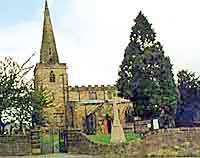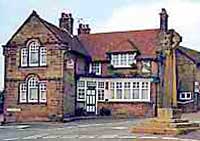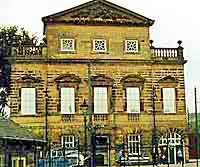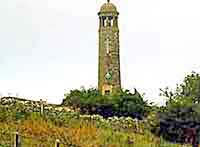Crich
Crich in Derbyshire - home to the National Tramway Museum
Crich in Derbyshire, known as Cardale in the television series Peak Practice, is a village full of character, nestling in the Derbyshire hills, 8 miles north east of Derby.
Crich is the home of the National Tramway Museum, set in a limestone quarry with authentic period street scenes, including the facade of Robert Adam's beautiful Derby Assembly Rooms, damaged by fire and subsequently demolished. There are several exhibitions and a variety of vintage trams from all over the world. A tramway was originally installed by George Stevenson to carry limestone from the Cliffe quarry to the lime kilns at Ambergate. Limestone is still mined at the quarry. George Stevenson often stayed at the Wheatsheaf Inn in the village.

Crich church |

Crich cross |

Tramway centre |

Crich stand |
Lead had been mined at Crich since Roman times and the limestone was quarried for lime burning and road making. In the 18th century there were many lime kilns in the village centre.
The 19th century saw a new local industry developed, that of framework knitting. Knitting frames were installed in the upper rooms of cottages or in adjacent outbuildings. Cotton was distributed and work collected from the village warehouses. In 1857 there were about 100 such frames in Crich and several framesmiths, who set them up and repaired them.
Crich has many old gritstone cottages and other buildings, the most important being ST Marys Church which dates from 1135, with it's Norman nave, columns and font. The chancel and tower were added in the 14th century and the clerestory and porch a little later. It has remained relatively unchanged since. In the North aisle recess there is a good late 14th century effigy of a bearded man in a long frock, presumed to be Sir William de Wakebridge, whose family is believed to have been wiped out by the Black Death. There are also monuments to German Pole, Godfrey Beresford and John Clay.
A Wesleyan chapel built in 1765 is believed to be the oldest still in use in the country. John Wesley came here to preach in 1766 when the chapel stood on common ground skirted by packhorse tracks.
The pub, the Jovial Dutchman, commemorates the Dutch navvies who helped to dig the Cromford Canal in the late 18th century.
Perched on top of the hillside is Crich Stand, which standing at 1000ft above sea level is a landmark for miles. It is a war memorial, built in 1923 and dedicated to the Sherwood Foresters who died in the first world war. A lantern shines at nightime and there is an annual pilgrimage to the stand by the regiment on the first Sunday in July.